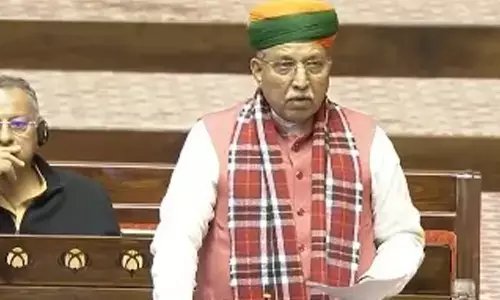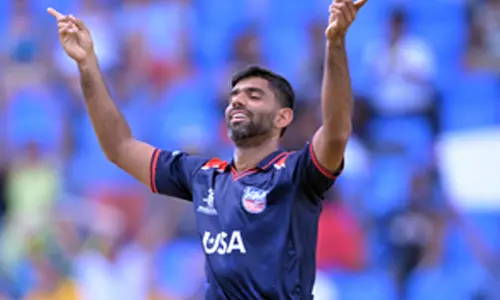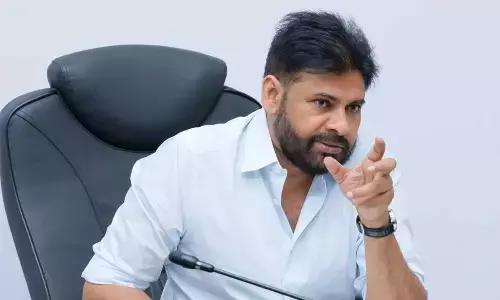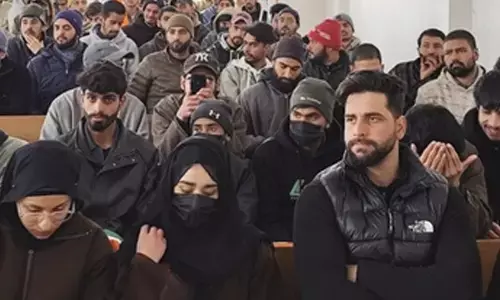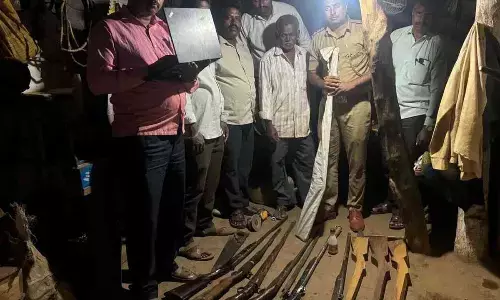Political chicanery at its peak
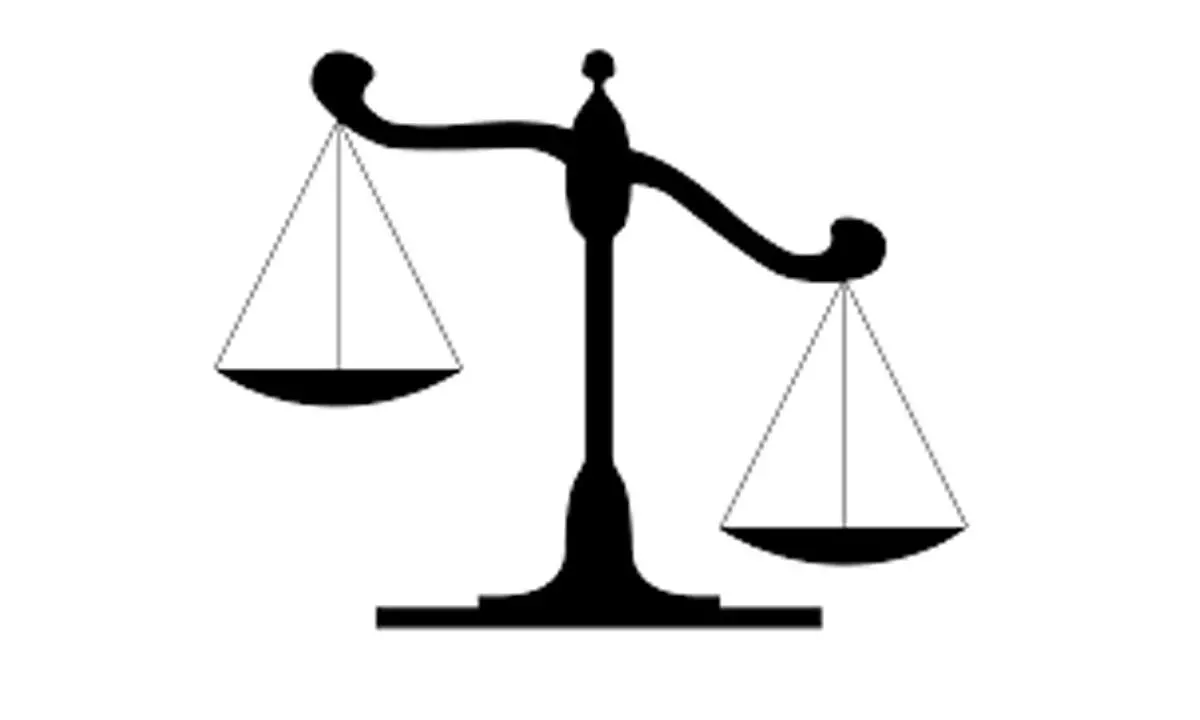
Political chicanery at its peak
Bharatiya Janata Party has completed 43 years of its formation – or shall we say conversion from Jana Sangh to BJP? The history of BJP is linked to Jana Sangh which was formed in Delhi on October 21, 1951.
Bharatiya Janata Party has completed 43 years of its formation – or shall we say conversion from Jana Sangh to BJP? The history of BJP is linked to Jana Sangh which was formed in Delhi on October 21, 1951. The foundation stone of Jana Sangh was laid by Shyama Prasad Mookerjee who was Industry Minister in the government headed by Pt Jawaharlal Nehru. He quit his post and formed a new political party as an alternative to Congress.
Mookerjee was unhappy that lakhs of people had migrated after the partition of India and Pakistan. Both countries were suffering from severe riots due to the Nehru-Liaquat Pact. There was an agreement between the two countries that they would set up minority commissions. Mookerjee felt that there was a need for alternative politics. He felt that the Congress party under Nehru was following the Liaquat Pact (policy of Muslim appeasement.) Hence, he resigned from the cabinet and formed a new political party.
The desire for alternative politics against the policies of Jawaharlal Nehru started to brew in Shyama Prasad Mookerjee's mind. Describing the Nehru-Liaquat Pact as Nehru's policy of Muslim wappeasement and expressing his opposition to the decision of the Congress government to ban Rashtriya Swayamsevak Sangh (RSS) after the assassination of Mahatma Gandhi, he resigned from the post of Union Industries Minister on 19th April, 1950 and took it upon himself to form a new political party as an alternative to the Congress.
Mookerjee worked out a political strategy in consultation with Madhav Sadashivrao Golwalkar, then Sarsanghchalak of the RSS. Other prominent leaders were Balraj Madhok and Deendayal Upadhyaya. The election symbol of the Jana Sangh was 'deepak' (oil lamp) and it had a saffron flag. This symbol was equally popular as the Cow and Calf of Congress party.
Jana Sangh made its foray for the first time into Lok Sabha in 1952 and won three seats – two from West Bengal and one from Rajasthan. The three elected representatives were Shyama Prasad Mookerjee (Kolkata South-East seat), Durga Charan Banerjee (Midnapore-Jhargram seat) and Umashankar Trivedi (Chittor, Rajasthan). Uniform Civil Code, ban on cow slaughter, and abrogation of Article 360 were first sought by Jana Sangh, not by BJP, as many present-day neo-politicians keep stating.
The Jana Sangh demanded integration of Jammu and Kashmir in 1953 as permit was required to go to J&K and it had its own Prime Minister. From three seats, Jana Sangh managed to increase its strength to 35 seats in 1971 and vote share to about 8%. It had a strong presence in Haryana, Madhya Pradesh, Bihar, Uttar Pradesh, Rajasthan and Gujarat. However, it could not enter South India. It was after the death of Mookerjee that Atal Behari Vajpayee and L K Advani rose to the helm of Jana Sangh.
The Jana Sangh got political momentum when the then Prime Minister Indira Gandhi imposed Emergency in the country and all the Jana Sangh top leaders were put in jail. Later, when Janata Party was formed under leadership of Morarji Desai, Jana Sangh merged with JP. Atal Behari Vajpayee became the External Affairs Minister and L K Advani was the Information and Broadcasting Minister.
However, Janata Party which was riddled with internal factions opposed the continuation of former Jana Sangh leaders in RSS. The Janata Party, after its decimating defeat in 1980 Lok Sabha elections, passed a resolution banning association of its members with RSS. Then, Atal Behari Vajpayee, Lal Krishna Advani and other leaders of the Jana Sangh announced the formation of a political party called the Bharatiya Janata Party (BJP) at Feroze Shah Kotla Ground in Delhi on April 6, 1980, and Vajpayee became the first president of the BJP. Oil lamp symbol was replaced with Lotus because this symbol was earlier used to revolt against the British Raj. BJP showcased it as a symbol of Hindutva and nationalism.
The BJP came to power in states for the first time with LK Advani as the party president. In March 1990, the BJP formed governments in three states simultaneously, including Rajasthan, Madhya Pradesh and Himachal Pradesh. If one looks back at the political scenario, it now appears that the era of healthy politics got buried under politics of cunningness, and politics of vendetta had become predominant. Now, a situation has arisen where the thin line between party and government, politics and governance has been removed.
The present-day leaders irrespective of party have single point agenda: Decimate the opposition if in power, or cry foul against the ruling party if in opposition. The ruling party leaders (all political parties without exception) talk of democracy, rules, ethics, need for federal politics, but all behave like autocrats.
The country had never seen the civil servants, whether it be the law enforcing agencies or the administrators, blindly following the government line though they are supposed to be guiding the party in power in good governance. Opposition parties cry hoarse that the Centre is misusing probe agencies. But in the recent years we have seen how the police is being used to terrorise those who question the ruling party or raise any issue pertaining to people. Everyone talks of fourth estate and its importance but treats media as untouchables and show utmost contempt towards them. Their voice is muzzled by all governments without any exception.
In the past, Prime Ministers, whether it be Indira Gandhi or Rajiv Gandhi, or Atal Behari Vajpayee or V P Singh, had the magnanimity to take criticism from the media and act on the feedback they got from the fourth estate. Even when they felt offended by some questions, they never used to insult the reporters but used to explain their viewpoint.
But now a situation has been created where no reporter can question the omissions and commissions of the government. If anyone tries, he is badly snubbed. Wide powers to officials to file cases against such newspapers or magazines have been given. Yet, the present-day rulers do not get tired of giving lectures on democracy, free speech, freedom of press etc.
Political rivalry between Chief Ministers and Prime Minister has reached a new level. Egoism dominates all practices and protocols. Chief Ministers refuse to participate even in the official programmes launched by the Prime Minister. There were times when the founder president of Telugu Desam Party N T Rama Rao clashed with Congress which was in power at the Centre, but he never avoided receiving the PMs. Indira Gandhi used to like NTR as much as she hated him. So was the case with Rajiv Gandhi.
Another new trend is questioning of educational qualifications of leaders. This makes a real mockery of democracy. Where does it say that to become a political leader one should have degree? Every government whether at Centre or in state has a finance minister. Are they financial experts? Are health ministers doctors and medical experts? Are education ministers educationists? These parties which are now raising the issue of educational qualifications should first clarify whether they would change the Constitution and prescribe minimum educational qualifications for politicians so that people can judge whether they approve it or not.
If that is their real intention, maybe it is a good move but before that they need to prove their sincerity and remove all those who are not degree holders from their own council of ministers and constitute a cabinet of educated people, The country has become a victim of lectures sans intention to practise what is preached. If they are really so serious to bring in a "qualitative" change in politics, they should first start by weeding out members with criminal background from their parties. Are they ready for this reform?
It's time for political parties to stop acting as election machines but try to win the hearts of voters. That would be possible only when they understand the importance of being inclusive. Prime Minister Modi also emphasised on this aspect during his speech at the BJP formation day, but one needs to see how much of this advice would be put to practice at the ground level.









